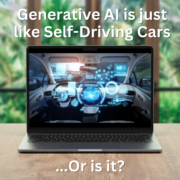Generative AI is just like Self-Driving Cars… Or is it?

The introduction of generative Artificial Intelligence (AI) has been nothing short of a game changer for marketers. AI for marketers can be compared to operating an autonomous vehicle. Although it is much more than just a metaphor, it captures the essence of navigating new territory. However, is the comparison as simple as it appears, or are there surprising twists and turns along the way? Is AI better suited as a “co-pilot” than “autopilot”? Let’s explore.
The Roadmap of AI in Marketing:
AI, much like an autonomous vehicle, provides marketers with a roadmap that promises efficiency, precision, and unprecedented insights. From predictive analytics to tailored content recommendations, AI tools have revolutionized the marketing process, making it more data-driven and customer-centric. Companies like HubSpot and Salesforce have already adopted AI to increase workflows and create a more seamless experience across channels. As marketers take the wheel, they have a formidable co-pilot to help them navigate the complexities of customer behavior and market trends.
The Steering Wheel in Marketers’ Hands:
Unlike a fully autonomous vehicle, AI in marketing puts the steering wheel squarely in the hands of the human driver – the marketer. While AI can digest massive quantities of data and deliver significant insights, you ultimately determine the destination. This human-AI relationship adds a dynamic element to the trip, allowing marketers to use their own creativity, intuition, and strategic thinking alongside AI’s analytical capabilities. Using AI is not a fully autonomous solution, it’s meant to be an extension of your capabilities.
Avoiding Potholes:
Just like a cautious driver anticipates and avoids potential road hazards, marketers must take caution when incorporating AI into their campaigns. Ethical considerations, data protection, and transparency are all potholes that must be addressed. Furthermore, providing incorrect information in your content that contradicts your brand identity (or that of other organizations) can give your readers a negative impression. Marketers must ensure that the AI systems they employ follow ethical standards and protect user privacy while avoiding any deviations that could harm their brand.
Traffic Jams:
In the world of AI-driven marketing, challenges can be likened to unexpected traffic jams. Whether it’s algorithm bias, limited data quality, or the need for continuous learning, marketers must be prepared to navigate these obstacles. For example, OpenAI’s ChatGPT has a database of information, but only from a specific period. If you are looking to summarize an article that just came out in 2024, ChatGPT responds with. “I’ll do my best to help based on the knowledge available up to my last update in January 2022”. Flexibility and adaptability become the GPS guiding marketers through unforeseen delays, ensuring that the marketing journey stays on course.
The Pit Stops:
Similar to a vehicle needing occasional maintenance, AI in marketing requires continuous learning and adaptation. Learn from the mistakes AI is making to prevent similar outcomes in the future. Similar to going to the mechanic, provide your AI platform with as much information as possible to diagnose the issue and provide a solution. As a marketer, you must be proactive in keeping up with the latest AI breakthroughs, refining your plans, and ensuring that your campaigns align with the ever-changing algorithms. Pit stops become opportunities for expansion and optimization.
The Final Destination:
Ultimately, the destination for marketers and AI is not just about reaching a numerical goal but ensuring customer satisfaction. Just as an autonomous vehicle aims for a smooth and enjoyable ride, AI-driven marketing endeavors to create seamless, personalized experiences that resonate with the audience.
AI for marketers is comparable to driving an autonomous vehicle – a journey filled with excitement, challenges, and the need for responsible navigation. While AI provides a powerful engine, it is the human touch that defines the route and destination. Embracing AI in marketing is not about relinquishing control, but about harnessing the potential of technology to enhance creativity, efficiency, and customer satisfaction. As marketers take the wheel, the road ahead is one of endless possibilities.

